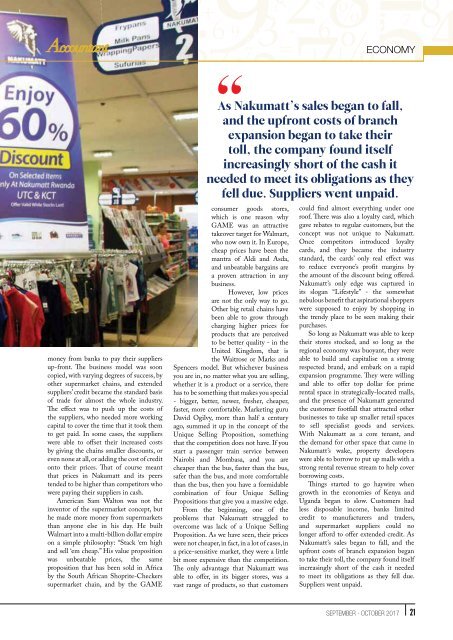The-Accountant-Sep-Oct-2017-Final
You also want an ePaper? Increase the reach of your titles
YUMPU automatically turns print PDFs into web optimized ePapers that Google loves.
Economy<br />
money from banks to pay their suppliers<br />
up-front. <strong>The</strong> business model was soon<br />
copied, with varying degrees of success, by<br />
other supermarket chains, and extended<br />
suppliers’ credit became the standard basis<br />
of trade for almost the whole industry.<br />
<strong>The</strong> effect was to push up the costs of<br />
the suppliers, who needed more working<br />
capital to cover the time that it took them<br />
to get paid. In some cases, the suppliers<br />
were able to offset their increased costs<br />
by giving the chains smaller discounts, or<br />
even none at all, or adding the cost of credit<br />
onto their prices. That of course meant<br />
that prices in Nakumatt and its peers<br />
tended to be higher than competitors who<br />
were paying their suppliers in cash.<br />
American Sam Walton was not the<br />
inventor of the supermarket concept, but<br />
he made more money from supermarkets<br />
than anyone else in his day. He built<br />
Walmart into a multi-billion dollar empire<br />
on a simple philosophy: “Stack ‘em high<br />
and sell ‘em cheap.” His value proposition<br />
was unbeatable prices, the same<br />
proposition that has been sold in Africa<br />
by the South African Shoprite-Checkers<br />
supermarket chain, and by the GAME<br />
As Nakumatt’s sales began to fall,<br />
and the upfront costs of branch<br />
expansion began to take their<br />
toll, the company found itself<br />
increasingly short of the cash it<br />
needed to meet its obligations as they<br />
fell due. Suppliers went unpaid.<br />
consumer goods stores,<br />
which is one reason why<br />
GAME was an attractive<br />
takeover target for Walmart,<br />
who now own it. In Europe,<br />
cheap prices have been the<br />
mantra of Aldi and Asda,<br />
and unbeatable bargains are<br />
a proven attraction in any<br />
business.<br />
However, low prices<br />
are not the only way to go.<br />
Other big retail chains have<br />
been able to grow through<br />
charging higher prices for<br />
products that are perceived<br />
to be better quality - in the<br />
United Kingdom, that is<br />
the Waitrose or Marks and<br />
Spencers model. But whichever business<br />
you are in, no matter what you are selling,<br />
whether it is a product or a service, there<br />
has to be something that makes you special<br />
- bigger, better, newer, fresher, cheaper,<br />
faster, more comfortable. Marketing guru<br />
David Ogilvy, more than half a century<br />
ago, summed it up in the concept of the<br />
Unique Selling Proposition, something<br />
that the competition does not have. If you<br />
start a passenger train service between<br />
Nairobi and Mombasa, and you are<br />
cheaper than the bus, faster than the bus,<br />
safer than the bus, and more comfortable<br />
than the bus, then you have a formidable<br />
combination of four Unique Selling<br />
Propositions that give you a massive edge.<br />
From the beginning, one of the<br />
problems that Nakumatt struggled to<br />
overcome was lack of a Unique Selling<br />
Proposition. As we have seen, their prices<br />
were not cheaper, in fact, in a lot of cases, in<br />
a price-sensitive market, they were a little<br />
bit more expensive than the competition.<br />
<strong>The</strong> only advantage that Nakumatt was<br />
able to offer, in its bigger stores, was a<br />
vast range of products, so that customers<br />
could find almost everything under one<br />
roof. <strong>The</strong>re was also a loyalty card, which<br />
gave rebates to regular customers, but the<br />
concept was not unique to Nakumatt.<br />
Once competitors introduced loyalty<br />
cards, and they became the industry<br />
standard, the cards’ only real effect was<br />
to reduce everyone’s profit margins by<br />
the amount of the discount being offered.<br />
Nakumatt’s only edge was captured in<br />
its slogan “Lifestyle” - the somewhat<br />
nebulous benefit that aspirational shoppers<br />
were supposed to enjoy by shopping in<br />
the trendy place to be seen making their<br />
purchases.<br />
So long as Nakumatt was able to keep<br />
their stores stocked, and so long as the<br />
regional economy was buoyant, they were<br />
able to build and capitalise on a strong<br />
respected brand, and embark on a rapid<br />
expansion programme. <strong>The</strong>y were willing<br />
and able to offer top dollar for prime<br />
rental space in strategically-located malls,<br />
and the presence of Nakumatt generated<br />
the customer footfall that attracted other<br />
businesses to take up smaller retail spaces<br />
to sell specialist goods and services.<br />
With Nakumatt as a core tenant, and<br />
the demand for other space that came in<br />
Nakumatt’s wake, property developers<br />
were able to borrow to put up malls with a<br />
strong rental revenue stream to help cover<br />
borrowing costs.<br />
Things started to go haywire when<br />
growth in the economies of Kenya and<br />
Uganda began to slow. Customers had<br />
less disposable income, banks limited<br />
credit to manufacturers and traders,<br />
and supermarket suppliers could no<br />
longer afford to offer extended credit. As<br />
Nakumatt’s sales began to fall, and the<br />
upfront costs of branch expansion began<br />
to take their toll, the company found itself<br />
increasingly short of the cash it needed<br />
to meet its obligations as they fell due.<br />
Suppliers went unpaid.<br />
september - october <strong>2017</strong> 21

















